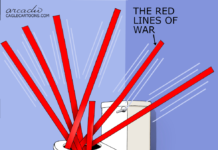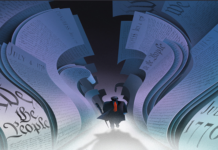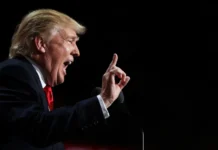 Scott Morrison has stated he wants to govern in the “Howard tradition”, but sadly that has also entailed adopting the worst of John Howard’s strategies: to admit or explain as little as possible. Recall the former prime minister’s commitment to the Iraq war without parliamentary debate, the Tampa and children-overboard affairs, the Wheat Board scandal, and the bugging of the government of Timor-Leste, just to mention the most conspicuous cases.
Scott Morrison has stated he wants to govern in the “Howard tradition”, but sadly that has also entailed adopting the worst of John Howard’s strategies: to admit or explain as little as possible. Recall the former prime minister’s commitment to the Iraq war without parliamentary debate, the Tampa and children-overboard affairs, the Wheat Board scandal, and the bugging of the government of Timor-Leste, just to mention the most conspicuous cases.
Secret whistleblower trial will only add to Australia’s shame over spying cover-up
There has never been a full accounting for these decisions. Indeed, in some cases there has been blatant cover-up. Moreover, there has been little discussion of the longer-term consequences. Successive governments since have acted as if they are beyond reproach.
In this vein, the Morrison government has avoided accountability for the sports rorts and other slush fund excesses. It is not commenting on ABC findings that Australian troops killed as many as 10 Afghan civilians during a 2012 raid in Kandahar Province, hiding behind an expected report from the Inspector-General of the Defence Force on alleged war crimes in Afghanistan. This begs the question of the appropriateness of the ADF investigating itself.
The government is also attempting to stop the Auditor-General providing evidence that was critical of their $1.3 billion deal to purchase a new combat vehicle from arms manufacturer Thales, some two years after having used extraordinary powers to redact aspects following complaints from an “aggrieved” Thales.
And the government is still pursuing barrister Bernard Collaery in the courts over claimed breaches of intelligence secrecy laws in relation to an operation in Dili in 2004, when the Howard government spied on and bugged Timor-Leste officials’ private discussions about maritime boundary negotiations – to give Australia the upper hand.
Sixteen years after Australia’s spying activities against a friendly neighbour – diverted from the war on terrorism – the Morrison government is going to incredible lengths and expense to prevent the full facts from being admitted, to prevent ministers and bureaucrats of the Howard administration being held to account or the identification of business interests that were favoured.
The ACT Supreme Court ruled last month, in the government’s favour, that sections of the Collaery trial would be held in secret because material identified by the Attorney-General as sensitive should remain classified.
It is probably more than coincidence that Timor-Leste’s original negotiator, Xanana Gusmao, was keen to testify, having forced a renegotiation of the maritime boundaries through action in the Permanent Court of Arbitration in the Hague. Ironically, it backed a boundary that the Howard government had spied to avoid.
By objective assessment, this espionage was illegal, immoral and corrupt – a rich country seeking to disadvantage one of the poorest – to the obvious benefit of private companies, initiated by a government that had been wallowing in its role in achieving Timor-Leste’s independence. Our governments would, of course, defend secrecy about espionage aimed at combating terrorism and other security threats, but surely this doesn’t extend to blatantly commercial ventures that are against the interests of our friendly neighbour and, indeed, our national interest?
How is it consistent that our government takes a strong position against Chinese aggression in the South China Sea, but defends its spying activities to the detriment of Timor-Leste? How is this consistent with our defence of the global “rules-based system”?
The effect of the Witness K and Collaery cases is to send a chill through anyone who might contemplate exposing the immoral and illegal actions of their government.
There are important questions about the agendas and relationships of the public service and private sector advisers who drove and implemented this breach of foreign policy strategy, and about those who stood to benefit, and by how much they may have benefited financially or in what other way?
There are also important questions concerning conflicts of interest and whether some involved had existing or prospective relationships with the private sector beneficiaries at the time of the spying and subsequent negotiations, or were to benefit post politics?
All up, an overwhelming case for a National Integrity and Corruption Commission, with real teeth.
To recap, Collaery became the approved legal representative for Witness K, the Australian spy who thought there was something rotten about that operation. After unsuccessful attempts to raise the alarm through official channels, Witness K resorted to blowing the whistle and, ultimately, pleaded guilty last year to breaching secrecy laws.
But Collaery, the lawyer representing the whistleblower, is also accused of breaching those laws and will fight the charges – albeit while he is prosecuted under worrying secrecy.
Dili: Some of East Timor’s most respected political leaders are demanding the Morrison government drop the prosecution of Australian whistleblowers Bernard Collaery and former spy Witness K, as the Prime Minister prepares to land in East Timor on Friday.
Protesters marched through the streets of Dili on Wednesday in support of dropping the charges against Mr Collaery, a Canberra lawyer, and Witness K, a former Australian Secret Intelligence Service agent who revealed Australia had bugged East Timorese government offices during negotiations over a maritime boundary.
Jose Ramos Horta, a Nobel laureate and former prime minister and president of East Timor, told the Sydney Morning Herald and The Age it was “incomprehensible that in the current circumstances, on the merits of the case, they [the Morrison government] don’t stop it”.
“If Australia doesn’t show political leadership, moral leadership on this issue, every time we talk to Australian leaders I will wonder if they have a tape recorder in their pocket [or] if my office has been bugged,” he said.
Mr Morrison is due to meet Prime Minister Taur Matan Ruak in Dili on Friday to formalise the March 2018 agreement that finally creates a maritime boundary between East Timor and Australia. That deal unlocked access to oil and gas fields including the Greater Sunrise field, which is worth up to $US50 billion ($74 billion), and splits revenue from the field up to 80-20 Timor’s way. It replaces an earlier agreement, negotiated by the Howard government in the early 2000s, which had a 50-50 revenue split.
That deal was dumped by East Timor when it emerged the Australian government had bugged the government during negotiations. Witness K, who participated in the bugging operation and his lawyer, Mr Collaery, are now being prosecuted for breaching Australia’s secrecy laws. Witness K, whose name cannot be revealed for legal reasons, has indicated he is prepared to plead guilty.
But to many in East Timor, the pair are heroes who ensured a fair go for the tiny nation.
Former president and prime minister Xanana Gusmao told the ABC’s Four Corners he was willing to fly to Canberra to give evidence in support of Mr Collaery and Witness K. Mr Gusmao led the Timorese negotiations over the boundary, was a hero of the resistance to Indonesian occupation and remains an influential politician.
Mr Morrison is due to meet Mr Gusmao and President Francisco Guterres on his trip to Dili, which is the first by an Australian prime minister since Kevin Rudd’s visit in 2007. This visit marks the 20th anniversary of 78 per cent of East Timorese voting for independence from Indonesia.
Former East Timorese deputy prime minister Jose Guterres was another who said Mr Collaery and Witness K should not be prosecuted.
“Bernard Collaery loves Australia, I have known him for many years, he is a great guy. He and Witness K, I know he was an intelligence guy but even if you work in intelligence you are not a machine, you have common sense,” he said, adding the agent had spoken out because the bugging was ethically wrong.
Tomas Freitas, a spokesman for MKOTT (the movement against the occupation of the Timor Sea) which organised the protest, said the pair were “heroes” to ordinary East Timorese. Attorney-General Christian Porter, who has the power to drop the case, should do so immediately as prosecution would harm bilateral relations, Mr Freitas said.
“If it was not for Witness K and Bernard Collaery this [revised] treaty would not have been negotiated, agreed and signed,” he said. “The [independence referendum] celebration of the 30th of August 2019 and the signing of the maritime boundary will not be complete without the freedom of the pair.”
Porter said on Tuesday that pursuing the cases against Witness K and Collaery remained in the public interest, and that there was a reasonable chance of conviction.
Question marks remain over whether the Greater Sunrise field is viable, with opposition and civil society groups criticising the huge investment. But East Timor’s government believes the field’s development will open the door to greater economic development for the tiny island nation of about one million people.
Stop punishing Witness K for telling the truth on East Timor
Australia’s prestige in our region rests not just on our aid or our military might but also, we hope, on our reputation for dealing fair and straight.
That is why Prime Minister Scott Morrison made a serious mistake on a historic trip to East Timor last week by refusing to address the injustice Australia is committing against two of the tiny island nation’s best friends.
Related Article
The story goes back to 2004 when the Australian Secret Intelligence Service (ASIS) bugged the offices of East Timor’s prime minister during negotiations over sharing out the oil under the contested Timor Sea.
The story goes back to 2004 when the Australian Secret Intelligence Service (ASIS) bugged the offices of East Timor’s prime minister during negotiations over sharing out the oil under the contested Timor Sea.
With this illegally obtained inside information, Australia tricked East Timor into signing a rigged contract that would have funnelled as much as $5 billion more to Australia. Woodside Petroleum is the operator of the Greater Sunrise joint venture.
Imagine the outrage if China were found to be doing that now in the South Pacific.
East Timor might have never known about this dirty business but for the bravery and decency of an ASIS agent who blew the whistle about the bugging and offered to testify in a case East Timor brought against Australia at the International Court of Arbitration in The Hague in 2013.
ust as the case was about to go court, Australia shamefacedly agreed in 2016 to renegotiate the treaty in exchange for East Timor dropping the suit.
Yet once the new treaty was agreed, Australia brought charges against the ASIS whistleblower, known in documents only as Witness K, and his lawyer Bernard Collaery who helped him get the message out to the Hague.
Prime Minister Scott Morrison tried to turn the page on this disgraceful episode last week when he travelled to Dili to exchange diplomatic notes confirming the revised deal.
That signature might resolve the narrow commercial issue of sharing the oil revenue but Australia can only show it has learnt the moral lesson by dropping the case against Mr Collaery and Witness K.
Instead, Mr Morrison made the weak excuse that the case against Mr Collaery and Witness K was an internal Australian matter.
While East Timor Prime Minister Taur Matan Ruak diplomatically accepted this was not his business, Mr Morrison’s stance was deplored as a betrayal by heroes of East Timor’s independence movement including Xanana Gusmao and Jose Ramos Horta, and by Shirley Shackleton, widow of one of the Balibo Five journalists who died reporting on Indonesia’s illegal invasion in 1975.
The refusal to drop the prosecution also raises questions about our weak laws on the protection of whistleblowers, whether they be in ASIS or the banks or the Australian Tax Office.
Of course, in the interests of national security, our foreign spies sometimes break the law of the countries where they operate and given the nature of their work it would be ridiculous to subject them to the same scrutiny as other public servants.
But this was clearly an abuse of their powers which had nothing to do with national security.
While Witness K has said he could plead guilty, Mr Collaery says he will fight the case through the courts in order to expose what happened. That is a noble plan but the risk is that ASIS will try to have the case heard in secret and the facts, so long suppressed, will never be known.
That would be a new injustice. Australians have a right to know what is done in their name.























